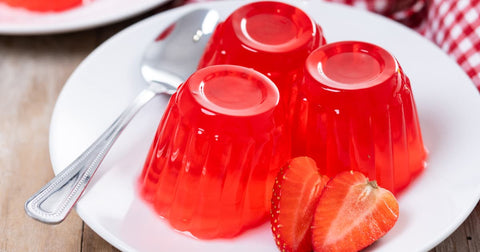Jello, with its jiggly texture and vibrant colors, is a nostalgic treat that many enjoy. But beyond its playful appeal, you might be wondering, "Is Jello good for you?"

The answer, like many things in nutrition, is: it depends. Let's dive into the world of Jello, exploring its ingredients, nutritional value, and potential health benefits and drawbacks.
What is Jello Made Of?
Jello's signature jiggly texture comes from gelatin, a protein derived from collagen extracted from animal bones and connective tissues. Other key ingredients include:
-
Water: The base of Jello.
-
Sugar or Artificial Sweeteners: Provides sweetness.
-
Adipic Acid and Fumaric Acid: Contribute to the tart flavor.
-
Artificial Flavors and Colors: Create the variety of Jello flavors.
Jello Ingredients: Variations and Considerations
-
Regular Jello: Contains sugar as the primary sweetener.
-
Sugar-Free Jello: Uses artificial sweeteners like aspartame or sucralose.
Is Jello Good for You? The Nutritional Breakdown
Jello is low in calories and fat-free. However, it also offers minimal nutritional value. A typical serving of Jello (half-cup) contains:

-
Calories: Around 80 calories (regular) or 10 calories (sugar-free)
-
Protein: About 2 grams (from gelatin)
-
Sugar: Around 18 grams (regular) or negligible (sugar-free)
Jello Calories: A Low-Calorie Treat
Jello's low calorie content makes it a popular choice for those watching their weight. However, it's essential to be mindful of added sugars in regular Jello.
Does Jello Have Collagen?
Yes, Jello contains gelatin, which is derived from collagen. Collagen is a protein that provides structure and support for your skin, bones, tendons, and ligaments.
Potential Benefits of Gelatin:
-
May support joint health: Some studies suggest that gelatin might help reduce joint pain and improve mobility.
-
Might promote skin health: Collagen is essential for skin elasticity and firmness.
-
Could aid in digestion: Gelatin might help soothe the digestive tract.
However, more research is needed to confirm these benefits.
Sugar-Free Snacks for Diabetics: Is Jello a Good Choice?
Sugar-free Jello can be a suitable option for people with diabetes, as it doesn't contain sugar and won't significantly impact blood sugar levels. However, it's important to be mindful of artificial sweeteners and their potential long-term effects.
Food Intolerance and Jello: Potential Triggers
While Jello is generally well-tolerated, some individuals might experience digestive issues after consuming it. This could be due to:
-
Artificial Sweeteners: Some people are sensitive to artificial sweeteners, which can cause digestive upset.
-
Food Dyes and Additives: Certain food dyes or additives in Jello might trigger reactions in sensitive individuals.
Food Sensitivity Test Kit: Identify Your Triggers
If you experience digestive discomfort after consuming Jello or other foods, consider taking a food sensitivity test kit. This can help you identify specific foods or ingredients that might be causing your symptoms, allowing you to make informed dietary choices and improve your gut health.

Key Takeaways:
-
Jello is a low-calorie, fat-free treat that contains gelatin, a protein derived from collagen.
-
While it offers minimal nutritional value, it might provide some potential benefits for joint and skin health.
-
Sugar-free Jello can be a suitable option for people with diabetes.
-
If you experience digestive issues after consuming Jello, consider a food sensitivity test to identify potential food intolerances.
Remember, this article is intended for informational purposes only and should not be considered a substitute for professional medical advice. If you have any concerns about your health or dietary choices, consult a qualified healthcare professional.
Frequently Asked Questions:
1. Is Jello a healthy snack?
Jello is low in calories and fat-free, making it a lighter treat compared to many other desserts. However, it also offers minimal nutritional value. While the gelatin in Jello might provide some benefits for joint and skin health, it's best enjoyed in moderation as part of a balanced diet.
2. Can I eat Jello if I'm trying to lose weight?
Sugar-free Jello can be a low-calorie treat option if you're watching your weight. However, it's essential to be mindful of your overall calorie intake and choose a balanced diet with plenty of whole, unprocessed foods for sustainable weight loss.
3. Is Jello good for my skin and joints?
Jello contains gelatin, which is derived from collagen, a protein that supports skin elasticity and joint health. While some studies suggest potential benefits, more research is needed to confirm these effects.
4. I'm experiencing digestive issues after eating Jello. Could it be a food intolerance?
Yes, it's possible to have a sensitivity to certain ingredients in Jello, such as artificial sweeteners or food dyes. If you experience digestive discomfort after consuming Jello, consider a food sensitivity test to identify potential triggers.
5. What are some healthier alternatives to Jello?
For a more nutritious and gut-friendly treat, consider options like:
- Fresh fruit with Greek yogurt: Provides protein, calcium, and probiotics.
- Chia seed pudding: Offers fiber, omega-3 fatty acids, and protein.
- Homemade fruit popsicles: A refreshing and hydrating treat with natural sugars.


.png?v=1737390083)
.png?v=1737187409)

